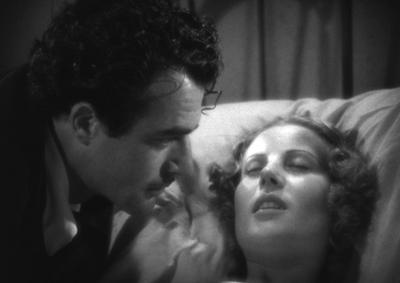Note: this double feature also screens Dec. 8 at the Downtown Independent.
Restored by UCLA Film & Television Archive with funding provided by The Packard Humanities Institute
La vida bohemia (U.S., 1938)
Produced independently by Jaime del Amo, the wealthy scion of a Spanish California family, the film was shot in a Los Angeles rental studio. Based on Scènes de la vie de bohème by Henri Murger, and the Giacomo Puccini opera, the latter without credit, the film sticks close to its sources: the young, tubercular seamstress, Mimi, falls in love with the impoverished playwright, Rodolfo, but poverty takes its toll on their relationship. When Mimi meets a wealthy suitor, Viscount Paul, to ask him for financial help, Rodolfo dumps her. Although shot on a very low budget, Frank Paul Sylos’ art direction, John Alton’s atmospheric lighting, and Josef Berne’s steady direction make this film look much more expensive. Alton, known for his many Argentine and American film noirs, considered it his favorite film. Unfortunately, the film’s literary pedigree made it less acceptable to working-class Mexican-American audiences. —Jan-Christopher Horak
Esta producción independiente de Jaime del Amo, el vástago adinerado de una familia española californiana, se rodó en un estudio alquilado de Los Ángeles. Basada en Escenas de la vida bohemia de Henri Murger y la ópera de Giacomo Puccini (esta última no acreditada), la película es fiel a sus fuentes: Mimí, una joven costurera tuberculosa, se enamora del pobre dramaturgo Rodolfo, pero la pobreza termina afectando a su relación. Cuando Mimí queda con un acaudalado pretendiente, el vizconde Paul, para pedirle dinero, Rodolfo la abandona. Aunque se rodó con un presupuesto muy limitado, la dirección artística de Paul Sylos, la evocadora iluminación de John Alton, y la firme dirección de Josef Berne hacen que la producción parezca mucho más cara. Alton, recordado por muchos de los largometrajes de cine negro que rodó en Argentina y Estados Unidos, la consideraba su película favorita. Desafortunadamente, el pedigrí literario del filme no consiguió seducir a un público formado por trabajadores estadounidenses de origen mexicano. (trans. Roberto Green)
35mm, b/w, 77 min. In Spanish with English subtitles. Production: Cantabria Films. Director: Josef Berne. Producer: Jaime del Amo. Screenwriter: José López Rubio. Cinematographer: John Alton. Cast: Rosita Díaz Gimeno, Gilbert Roland, Miguel Ligero, José Crespo.
Verbena trágica (U.S., 1939)
Cantabria’s second independent production was very successful in the cinemas of L.A.’s Mexican neighborhoods, although the narrative actually takes place in Spanish Harlem in New York City. On the eve of Columbus Day celebrations, the boxer Mateo returns home from a stint in prison and realizes that his wife is pregnant, and he can’t be the father. His wife Blanca has in fact been having a secret affair with her sister Lola’s fiancé, Claudio. Mateo confronts his wife, but she refuses to name the father, leading to tragic results. Produced at the Grand National Studios, the film stars Fernando Soler, the Mexican actor playing against type, which earned him kudos from the Spanish-language press. Other actors come from Spain, Puerto Rico, Cuba and the Philippines, making Verbena trágica an ode to New York’s multi-ethnic Latin community. —Jan-Christopher Horak
El segundo largometraje independiente de Cantabria tuvo mucho éxito en los cines de los barrios mexicanos de Los Ángeles, aunque la película transcurre en el Harlem español de Nueva York. En la víspera de las festividades del Día de la Raza, Mateo, un boxeador que ha pasado una temporada en prisión, regresa a su hogar, donde descubre que su mujer está embarazada y que él no es el padre. De hecho, Blanca, su esposa, está teniendo un romance secreto con Claudio, el prometido de su hermana Lola. Cuando Mateo exige a su mujer que le confiese quién es el padre y ésta se niega, se desata una tragedia. Realizada en los estudios de Grand National, la película esta protagonizada por la estrella mexicana Fernando Soler, aquí en un papel muy distinto a los que solía interpretar, lo que le valió el reconocimiento de la prensa hispana. La película también incluye actores españoles, puertorriqueños, cubanos y filipinos, que hacen de Verbena trágica una oda a la multiétnica comunidad latina de Nueva York. (trans. Roberto Green)
DCP, b/w, 85 min. In Spanish with English subtitles. Production: Cantabria Films. Director: Charles Lamont. Producer: Jaime del Amo. Screenwriter: Jean Bart, Miguel de Zárraga. Cinematographer: Arthur Martinelli. Cast: Fernando Soler, Luana Alcañiz, Juan Torena, Cecilia Callejo.






 Mobile Navigation
Mobile Navigation

